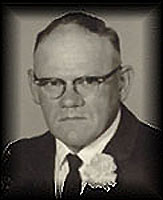
Paul M. Hiebert

Born: March 18, 1914
Place: Marion County, Kansas

MOTHER:
Marie Schmidt
FATHER:
Henry G. Hiebert
SIBLINGS:
Menno M. Hiebert
Helena M. Hiebert
Elizabeth M. Hiebert
Tina M. Hiebert
Otto M. Hiebert
Levi M. Hiebert
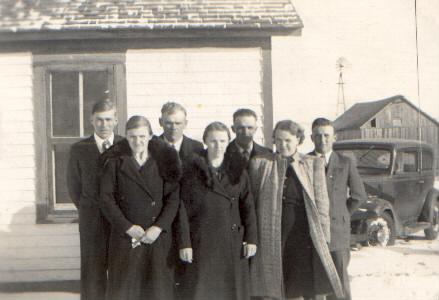 Left to Right: Otto, Lena, Paul, Tina, Menno, Elizabeth, Levi
Left to Right: Otto, Lena, Paul, Tina, Menno, Elizabeth, Levi

SPOUSE:
Sara Janzen
Married: April 18, 1937
Place: Tabor Mennonite Church, Goessel, Kansas
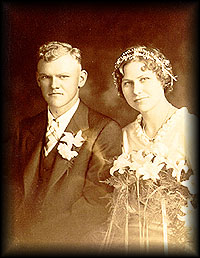
CHILDREN:
Donald Paul Hiebert
Norman Duane Hiebert
Mary Lou Hiebert
Johnnie Lee Hiebert
Bonnie Sue Hiebert
Paul and Sara's 25th Wedding Anniversary
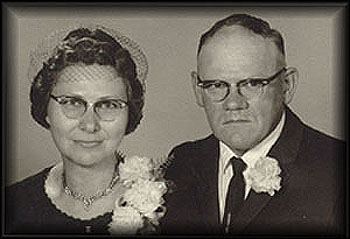
Widowed: March 18, 1974

SPOUSE:
Martha Jane Hubin Vogt
Married: September 10, 1983
Place: Alexanderwohl Mennonite Church, Goessel, Kansas
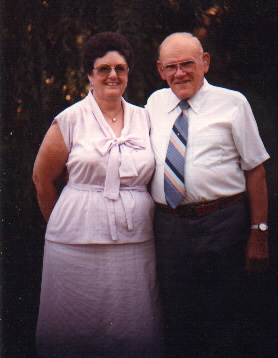


PAUL HIEBERT FAMILY
(L-R) Front Row: Lance Hiebert, Zach Showalter,
Evan Hiebert,
Alex Hiebert,
Kory Hiebert,
Kaylee Brown, Derick Brown; Second Row:
John Hiebert,
Mary (Hiebert) Lindeman,
Norman Hiebert,
Paul Hiebert,
Martha (Hubin Vogt) Hiebert,
Donald Hiebert,
Bonnie (Hiebert) Ratzlaff,
Sara Ratzlaff; Third Row: Lance Hiebert, Bertha Hiebert, Sydney Lindeman,
Marcia (Klaassen) Hiebert,
Deena (Hiebert) Wuest,
Amy Hiebert, June Hiebert, Sid Ratzlaff; Fourth Row: Tom Showalter, Scott Lindeman, Jonna (Lindeman) Showalter, Larry Lindeman, Lance Hiebert,
Kristy (Newell) Hiebert,
Chad Lindeman, Carrie Lindeman,
Lonnie Hiebert,
Lucinda (Sparrow) Hiebert,
DeWayne Hiebert,
Mike Hiebert,
DeVon (Hiebert) Brown, Jerry Brown, Kelly Ratzlaff, Aaron Ratzlaff, James Ratzlaff.
Picture taken Christmas 1998 (Not Pictured:
Joseph Wuest)

BIOGRAPHY
Written by Daughter Bonnie (Hiebert) Ratzlaff
Paul was born on March 18, 1914 in the family home (in the N.W. room). His parents were Henry and Marie Hiebert; he was the middle child of seven children. Paul was the only child in the family to be delivered by a doctor; the rest of the children were attended by a midwife. When asking Paul if he knew how much he weighed at birth he said, ďThatís a good one. But I heard the dog bark.Ē (I later learned that his family never had a dog until his younger brother Levi was born and that dog didnít live very long).
Paulís sister Elizabeth was about three years old when he was born. She was taken by her Dad to their grandmother Hiebertís home which was on the same farm yard. Elizabeth thought since the doctor came over that her mother was dying. Elizabeth was very frightened and bit her dad hard on the hand, a spanking followed.
Growing up on the farm meant hard work but also time for play. Paulís favorite plaything was a stick and rim. Chinese Checkers were played during the long winter evenings. Summer days were also spent fishing and swimming when chores would allow it. Christmas was spent with the grandparents and many cousins, aunts, and uncles. Zweibach and sausage was eaten, Christmas verses and songs were heard. The only Christmas tree that was to be seen was at the country school, where the Christmas Eve program was held. The candles were lit upon the tree while an older boy would keep watch so that there would not be a fire. Paul could always count on receiving a hankie for a Christmas gift.
Farm life meant a lot of hard work. Early mornings Paul would find himself in the barn feeding the horses and milking the cows, and there were always the eggs to gather. In the summer months, many ducks were raised. One of Paulís jobs was to herd the flock to the creek and then to keep an eye on them. Paul worked on the fields with horses; some of these horses were also used for riding. Dolly was a black horse and was one of the best they had. Other horses were Toots, Dick, Nellie, and Prince. Shirts and overalls was the attire for working in but they were also worn to school, maybe not with as many patches on them. School was a 2 mile hike; sometimes they were lucky enough to get a ride in the 2 seat buggy. Lunches at school were brought in tin pails, and usually consisted of home baked bread and molasses.
During the warmer months peddlers would come by the farm with medicines and salves to sell.
Times were very bad during the depression and dust bowl years. The family had hardly enough food to go around. The priceís on livestock was very cheap so they werenít able to sell them to get money to buy extra supplies.
Finally Paul was old enough to work away from home. He worked for Hugo Hiebert as a farm hand making 50 cents a day, a lot of money for a teenage boy.
When Paul turned 20 he bought his first car, a 1926 Chevy Sedan for a whole sum of 35 dollars. Now that he had a set of wheels it was time for the dating scene. After taking out a few girls he saw the girl of his dreams at a church program (Alexanderwohl Church). Sitting in back of this girl he had the nerve to lean forward and touch her arm. Thatís where it all began.
Courting Sara was usually done in the northeast room on the second floor of her home, with her mother always close at had. The wedding bells rang on April 18, 1937. The ceremony was held at the Tabor Mennonite Church with the Rev. P.H. Richert officiating. Music was provided by 2 brothers Harlow and Marvin Schmidt, friends and neighbors to the couple.
There was no honeymoon because money was scarce. After opening gifts they traveled to their new home which was a few miles north of the Alexanderwohl Church. Paul had already lived here for a year so he tried to make the home a little cozy for his new bride. Here they lived for almost 2 years, deciding to move in with Saraís mother when her sister Ruth married. Mother Janzen did not want to be alone and thought that Paul and Sara should come and farm her land.
Paul never knew his grandpa Hiebert since he had died in 1911, but he knew his grandpa Schmidt. This grandfather gave his grandchildren sweet wood to chew on (I hope this is some sort of candy).
Paulís grandma Hiebert was tall and heavy, but his grandma Schmidt was at the other end of the scale, she was a small little woman.
Paulís grandparents never spoke of their life in Russia or of crossing the ocean to come to America. Perhaps leaving their homeland was too painful to think about and that life will go on especially in a free country.
Paulís parents courted in a horse and buggy and were married in the Alexanderwohl Church.

BIOGRAPHY
Written by Grandaughter Sara Ratzlaff
Imagine one day you wake up to find you have a little sister. Where did she come from? Why were you never told this baby would arrive? Is this really my sister?
Such innocent questions ran through my grandpa Paulís head one day when he found a new addition to his family had arrived. He wouldnít dare ask where it came from. When my grandpa was young, they didnít speak of such things, like where babies come from. The parents didnít even think it was appropriate to tell their children that they were expecting a child.
When Paul was born in March 1914, a doctor was called to their house. He was the only one out of seven children that had a doctor on hand. All of the others had Midwives. When Marie (Paulís mother) went into labor with Paul, all of the children were sent to their grandparentís house. One of the children refused to leave her mother alone. At the age of three she already knew that if a doctor was present, somebody was going to die. This girl, Elizabeth, kicked, screamed, and even bit her dad trying to convince him to let her stay. As a result, she got the whipping of her life. What she didnít know was the midwife was out delivering another baby.
Paulís earliest memory was something his mom made for him. His mother put sugar into a piece of cloth, and then rapped it up in a little wad. Then she gave it to Paul as a pacifier.
Paul was a very skinny boy. In church one time he fell through the back of the pew. Maybe he was so small because of the type of food he ate. For breakfast Paul enjoyed lard on bread. But his all time favorite food was fried oatmeal.
During the summer, heat created quite a problem. Paulís family didnít have an ice box so they had to hang their food in the well. The heat didnít only affect the food though. Paulís room was upstairs, so naturally it was warmer up there. It got so hot, he couldnít stand it anymore, so he slept on the windowsill.
Heat wasnít the only thing that affected Paulís room. In the winter, they wouldnít dare go to the bathroom in the outhouse. So they used a pot that fit snuggly under their bed. By morning everything that was put into the pot during the night had been frozen. In order to dispose of the waste, they would have to put it on the stove to melt it. Then they could throw it out.
Farm life meant a lot of hard work. In the early mornings Paul would find himself in the barn feeding the horse, milking the cows, and gathering eggs. In the summer months Paulís job was to herd flocks of ducks to the creek and keep an eye on them. As a young child, Paul worked hard on his fatherís farm that was near Hillsboro. Paul also got to work the fields with horses. Some of these horses were also used for riding. Dolly was a black horse and was one of the best they had. Other horses were Toots, Dick, Nellie, and Prince.
Shirts and overalls was the attire for working, but the children had to be careful not to rip them. These clothes doubled as school clothes. Their school, Steinback, was a two-mile hike and sometimes they were lucky enough to get a ride in the two-seat buggy. Lunches at school were brought in tin pails, and usually consisted of home baked bread and molasses.
During school, Paul and the rest of the school children enjoyed baseball and hide and seek. Paulís favorite classes were spelling and arithmetic. He never did go to high school though. After he graduated from grade school, he went to work on his fatherís farm.
Christmas was spent with his grandparents, many cousins, aunts, and uncles. Zweibach and sausage was their main two food groups. Every year the children could say their verses and sing their little songs for the whole family. Paul could always count on getting a hanky for a Christmas present.
Unlike present day, the people around in Paulís area only had one tree. This tree was placed in their schoolhouse. Then instead of having their Christmas Eve program in church, they had it in school. The tree always had to be watched very carefully though. One of the schoolboys would walk around the tree and make sure it wouldnít catch on fire (the tree had candles on it). On one particular occasion the boy watching the tree wasnít paying attention to it. Letís just say, nobody enjoyed a Christmas tree that year and the only thing the boy got for Christmas was a spanking.
Christmas wasnít only celebrated on the twenty-fifth. Starting on Christmas morning, they went to church for three days. But the service was not Christmas related.
In the winter Paul wore ďhighĒ top shoes. These shoes laced up all the way to his knees. On Sundays, Paul wore knickers.
During the depression the family hardly had enough food to go around. The price on livestock was very cheap so they werenít able to sell them to get money to buy extra supplies. Finally Paul was old enough to work away from home, so he became a farm hand for Hugo Hiebert. Paul made fifty cents a day, which was a lot for a teenage boy.
When Paul turned 19, he started to date a girl named Sara Janzen. On their third date, Sara told Paul their relationship was over. Naturally, Paul was very confused. He really liked Sara and enjoyed her company. He asked what was wrong and she said, ďI donít want to be involved with a man that smokes!Ē How in the world did she find that out? Paul used mints and Sen-Sen (a strong type of candy) to cover up the smell. Paul never gave it a thought that his clothes might smell.
ďWell,Ē Paul asked Sara, ďIf I stop smoking, could I come back and see you sometime?Ē Sara agreed and left it at that. When Paul went home that night, he gathered up all of his cigars and tobacco and tossed them out the window. Paul was twenty-three when he married Sara Janzen. Two years after they were married, they moved in with Saraís mother.
Much later in Paulís life, he was on the Emmenthal School Board. This school was the same one where his wife Sara went when she was younger.
Paulís main source of income was farming, but for a few years he was an auctioneer. His partner was Johnnie Schroeder. Another job was working for Red Vogt in his lumberyard. When Bonnie (his last child) came along, he started working for Guerdons trailer factory in Newton. Paul worked here until the company closed around 1974.
Paul finally took a job in Hesston Corp. and worked there for about three years. In his early retirement years, he worked as a custodian at the Alexanderwohl Mennonite Church.
Papa Paul (as we used to call him) has always been exciting and interesting to me. From the way he takes out his teeth to his many stories he has to share. Iím so thankful I got a chance to know him.
I wasnít as fortunate to have known my grandma Sara though. She died in 1974 of a stroke. Paul sold the farm were his wife grew up and sold most of their belongings along with it. He then moved down the road to the house located on 80th street along Highway 15. In 1983 Grandpa remarried a widow named Martha Vogt. They lived in that house for a while, but soon moved to a house in Goessel.



















